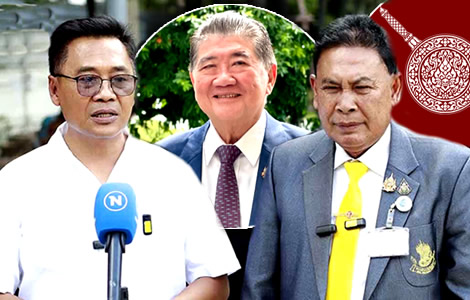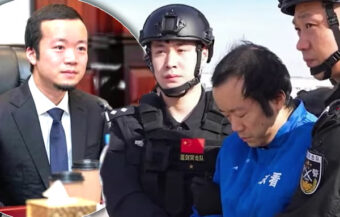Acting PM Phumtham suffers a crushing day as his failed attempt to dissolve parliament triggers multiple criminal complaints, Section 157 and lèse-majesté charges, sidelining Pheu Thai while Anutin Charnvirakul prepares to become Thailand’s next Prime Minister.
Wednesday left Acting Prime Minister Phumtham Wechayachai bruised and exposed. His gamble to dissolve parliament backfired after the People’s Party backed Anutin Charnvirakul. By afternoon, Pheu Thai was contemplating the opposition benches, while a wave of criminal and legal complaints hit police and anti-corruption agencies. He now faces malfeasance charges under Section 157 and lèse-majesté for dragging the monarchy into politics.

On Wednesday, Supachai Jaisamut, Chairman of the Bhumjaithai Party, filed a formal complaint against Acting Prime Minister Phumtham Wechayachai. He went to Dusit Metropolitan Police Station to accuse Mr. Phumtham of malfeasance under Section 157 of Thailand’s Criminal Code. The complaint followed the caretaker prime minister’s submission of a royal decree requesting a dissolution of parliament, which the Privy Council immediately rejected.
The timing amplified political tension and the day’s sense of political drama. The request came minutes after the People’s Party publicly announced support for Anutin Charnvirakul as the next Prime Minister. Consequently, multiple factions scrambled to consolidate power, and the political temperature in Bangkok spiked. Analysts described the situation as unprecedented in recent parliamentary history.
Supachai files complaint against caretaker PM as dissolution request triggers political tension in Bangkok
Following the submission, the Privy Council rejected the request outright. The Council deemed it ill-prepared and, more importantly, unconstitutional. In particular, it cited advice from the Council of State, which serves as the government’s legal advisory body. According to this guidance, a caretaker prime minister lacks the authority to submit a royal decree dissolving parliament.
Legal scholars expressed mixed views. However, most emphasised that a caretaker prime minister, after the permanent removal of a sitting leader, faces severely limited powers. Moreover, they argued that submitting a dissolution request during an ongoing contest for government leadership is ethically questionable.
On Wednesday, the Privy Council’s rejection was subsequently sent to the Acting Prime Minister in writing through a letter from the Cabinet Secretariat. Certainly, he was left in no doubt that the move was constitutionally unacceptable.
Separately, political activists filed additional complaints, including one under Section 112 of the Criminal Code. They argued that Mr. Phumtham wrongly involved the King in a political dispute. Consequently, the complaint alleged lèse-majesté, which carries serious legal implications.
Privy Council rejects caretaker PM decree while activists lodge Section 112 complaints against him immediately
On September 3, 2025, at approximately 4:47 p.m., Mr. Supachai formally lodged his complaint at Dusit Police Station. He was accompanied by members of the Bhumjaithai Party’s Legal Working Group. In his statement, he said Mr. Phumtham acted beyond his legal authority by submitting a request for royal approval.
According to Mr. Supachai, Mr. Phumtham had given several media interviews on September 2 and 3. In these, he described the democratic system as malfunctioning. He claimed the People’s Party and Bhumjaithai Party agreed to form a government, but the People’s Party did not formally join.
As a result, Mr. Phumtham argued, three political factions emerged. Pheu Thai would act as opposition, Bhumjaithai as minority government, and the People’s Party would operate both inside and outside government. He described the situation as unprecedented and cited it as justification for submitting a House dissolution request.
Furthermore, Mr. Phumtham stated that resolving political turmoil should return power to the people. However, he acknowledged that such matters fall under royal prerogative. Nevertheless, he submitted a royal decree on September 2, 2025 and claimed it complied with the Constitution.
Phumtham defends dissolution, citing unprecedented political split and returning power to the people
Mr. Supachai strongly disputed that claim. He cited the Secretary-General of the Council of State, who determined that a caretaker prime minister cannot submit such a decree. Therefore, he argued, Mr. Phumtham’s action could cause inappropriate tension with the Royal Court. Additionally, he requested investigators examine all involved parties if further evidence emerges.
Political activist Srisuwan Janya separately petitioned the National Anti-Corruption Commission (NACC) to probe Mr. Phumtham’s actions. He argued the move could constitute a serious breach of constitutional and ethical norms. Moreover, he urged the commission to determine whether collaborators assisted in the submission.
The New Democracy Party also filed complaints. At 2:30 p.m., party-list MP Suratin Picharn and activist Taikorn Pholsuwan submitted a Section 112 complaint at the Central Investigation Bureau’s Anti-Corruption Division. They alleged that Mr. Phumtham misused the monarchy for political purposes.
Mr. Taikorn said Mr. Phumtham’s request was inappropriate. He added that the acting prime minister lacked legal authority, power and rights to submit the decree. “This is an inappropriate action,” he said. “As a citizen, I must act to protect the institution.” His complaint signals that Mr. Phumtham is under serious legal and political pressure.
Legal pressure mounts on caretaker PM as multiple complaints allege overreach and misuse of monarchy
The constitutional backdrop stems from last week’s removal of Paetongtarn Shinawatra as Prime Minister. The Constitutional Court ruled she violated ethics regulations after a phone call with Cambodian leader Hun Sen. Her removal triggered intense competition among rival parties to form a new government.
Both Bhumjaithai and Pheu Thai actively courted the People’s Party for parliamentary support. On Wednesday morning, the People’s Party announced its backing for Bhumjaithai. Basically, it would support Mr. Anutin Charnvirakul as Thailand’s 32nd Prime Minister. Meanwhile, Mr. Phumtham maintained he had already submitted a royal decree requesting House dissolution. Consequently, he faced mounting legal and political scrutiny.
Observers noted the decree’s timing could have torpedoed critical negotiations to form a government. Legal and political attention intensified as complaints multiplied. Analysts described Mr. Phumtham’s move as risky, unprecedented and politically reckless. As a result, he appeared increasingly exposed and vulnerable.
Removal of previous PM and rejected decree leaves caretaker Phumtham exposed to mounting scrutiny
Mr. Supachai emphasised that Mr. Phumtham lacked legal authority. He cited the Council of State’s Secretary-General, Pakorn Nilprapunt, who explicitly ruled the caretaker prime minister could not submit dissolution decrees. Therefore, Mr. Supachai argued, exceeding authority under these circumstances constitutes malfeasance in office.
Activists warned the move could politicise the monarchy. They noted that multiple complaints, including Section 112 filings, create overlapping legal challenges. Investigators are expected to scrutinise whether any collaborators assisted in the submission. Analysts said the pressure leaves Mr. Phumtham politically and legally cornered.
Police on Wednesday confirmed receipt of complaints from the Bhumjaithai and New Democracy Party MPs, in addition to other activists. Investigators confirmed enquiries will focus on whether Mr. Phumtham acted beyond legal authority. Additionally, investigators will assess whether accomplices participated in the alleged misconduct.
The legal and political consequences are significant. Experts noted that the rejected decree, combined with multiple complaints, places Mr. Phumtham in legal jeopardy. Meanwhile, such proceedings can often take decades to play out at considerable cost if charges are pursued. Section 157 and Section 112 complaints are serious matters.
Multiple complaints and rejected decree put caretaker PM at the centre of a serious legal and political crisis
Observers highlighted that the controversy demonstrates the cut and thrust of Thai politics. Notably, political disputes can descend into a game of one-upmanship. At the same time, there is often recourse to filing criminal complaints against political adversaries.
From the People’s Party announcement to multiple complaints filed in rapid succession, the situation escalated quickly. Political actors and activists acted decisively to assert positions, emphasising legal limits and political accountability.
Legal experts underlined the main question: did Mr. Phumtham exceed his caretaker PM powers? They noted caretaker leaders have limited authority, especially after a Prime Minister’s permanent removal by the Constitutional Court. This is what happened on August 29 when former PM Paetongtarn Shinawatra was removed from her position.
Any attempt to dissolve parliament requires strict procedural adherence, which the rejected request did not meet. Complaints under Section 157 and Section 112 have created overlapping legal challenges. Political actors—from party chairs to activists—are leveraging courts and public opinion to punish Mr Phumthan for his gambit.
Rapid escalation of complaints highlights uncertainty over caretaker PM authority and rejected dissolution
Observers noted that the rejected decree is central to all legal challenges. Complaints focus on perceived overreach, potential misuse of the monarchy, and limits of caretaker authority. With investigations underway, Mr. Phumtham’s credibility and political standing are under severe pressure.
From a legal perspective, Section 157 complaints allege malfeasance, while Section 112 filings claim inappropriate royal involvement or usage. Together, these complaints cover a broad range of alleged violations, leaving Mr. Phumtham in potential legal hot water.
Indeed, few caretaker prime ministers have faced similar concentrated scrutiny in Thai politics. In short, Mr. Phumtham is at the centre of a legal and political storm. Investigations, including police and corruption agency probes, will decide later whether the acting prime minister faces charges.
Rejected House dissolution triggers multiple legal complaints, leaving Acting PM Phumtham in hot water
The combination of the rejected decree and formal complaints has left Mr. Phumtham exposed. On Wednesday evening, he tactfully refused to answer questions on the debacle before reporters.
He left behind an eventful day at Government House. His efforts to thwart the new political alliance unveiled in parliament between the People’s Party and the Bhumjaithai Party earlier on Wednesday were left in tatters.
People’s Party ready to elect Anutin Charnvirakul Prime Minister on Friday as election call is thwarted
Thailand falls deeper into the abyss of deep political crisis with two controversial decisions in minutes
Certainly, his silence was probably a wise decision as Thailand’s political crisis plays out. The next move comes before the House of Representatives on Friday. Thailand will see the election of its 32nd Prime Minister, with the chances being that the Pheu Thai Party will later find itself in opposition.
Join the Thai News forum, follow Thai Examiner on Facebook here
Receive all our stories as they come out on Telegram here
Follow Thai Examiner here
Further reading:
People’s Party meeting on Monday ended in chaos as it failed to decide on who it will support for PM
Strong case for Chaikasem Nitisiri to lead an interim government tasked with Constitutional change
Pheu Thai rattled by PM’s ouster. Risks complacently assuming the Premiership of Chaikasem Nitisiri
PM Paetongtarn Shinawatra ousted by Constitutional Court, collapsing Thai government over audio clip


















